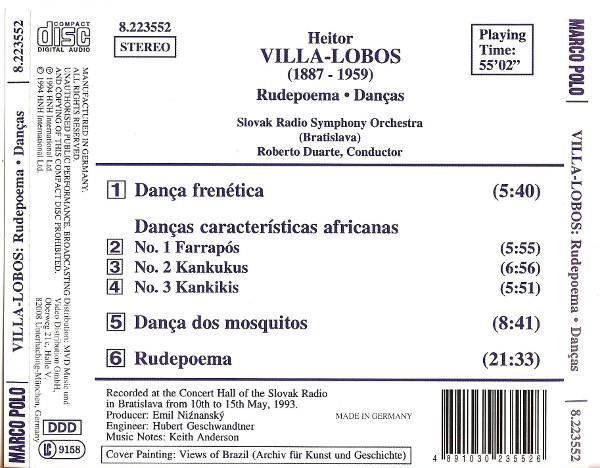More from Duarte in Villa-Lobos
Well, this was more enjoyable than listening to the composer's symphonic poems and ballets, at least for this listener.
Especially the five Danças settings.
The Dança Frenética and the three Danças Características Africanas remind me an awful lot of Villa-Lobos' twelve Chôros. That underlying rhythmic groove, the folk-like melodies, and as with all of his orchestral music, the colors he imbues into this music.
The Dança Dos Mosquitos lies somewhere between these ideas and the atmospheric symphonic poems and ballets released from these same performers earlier on Marco Polo. Here, however, Villa-Lobos characterizes the titular mosquitos almost too successfully, for the endless sliding, high-pitched violin harmonics make the skin crawl.
Rudapoema is firmly in the Stravinsky mold, even if it begins in the vein of the other Danças. This work takes a little more effort on my part, such as the repeated listenings I gave the composer's Gênesis and Erosão. It is more serious, more atmospheric, lengthier, with tribalistic rhythmic stabs and harmonic punctuations, yet not particularly tough from an aurally modernistic point of view.
I am pretty sure this is the only recording with Rudapoema on it, so this performance is a treasure for that work, and the orchestrated version (its original is for solo piano) of the Danças Características Africanas is not the norm either. I do think Roberto Duarte could have led the Slovak orchestra with more forward drive in lieu of the grandiose statement we get, but they play well enough and Marco Polo's sound is up to the task.
A review from 2024
If you enjoy the populous-pleasing Bachianas Brasileiras and Chôros from Brazilian composer Heitor Villa-Lobos, this could be a nice follow up to see if you like his other output, which can be hit and miss for listeners.
In my opinion, the five Danças offered here are very much in the vein of Villa-Lobos’ Chôros. Shorter melodic cells to grasp onto, exotic orchestral colors, and a penchant for catchy, syncopated rhythms. There is also a light element of folk music and jazz which are interesting.
The Rudapoema, and to some degree the Dance of the Two Mosquitos, take their influence from Stravinsky. Like the album of Villa-Lobos symphonic poems and ballets from this same team of performers on Marco Polo, these are more about atmosphere and striking stabs of rhythm with a primitivistic vibe, rather than tuneful or tightly structured for easier listening.
Roberto Duarte and the Slovak RSO go for swollen grandeur, and it certainly suits this music just fine. All the same, I could imagine a more driven approach, especially to the dances, where Duarte prefers a big, grandly slow march through this music. The orchestra plays well, however, and the Marco Polo sonics are fine, even if neither are amazingly impressive from a modern standpoint.
Listen on YouTube
Works
Dança Frenética (5.40)
Danças Características Africanas (18.42)
Dança Dos Mosquitos (8.41)
Rudapoema (21.33)
Performers
Slovak Radio Symphony Orchestra
Roberto Duarte, conductor
Label: Marco Polo
Year: 1994
Total Timing: 55.02
I like Roberto Duarte's series on Marco Polo, even if Villa-Lobos' music takes some getting used to.
I could imagine someone doing this better though, for Duarte is like an elephant in the Dances.
Odd, Naxos never reissued these onto their label like they tend to do with the older Marco Polo recordings. Oh well...
Find more Villa-Lobos recordings HERE!


Comments
Post a Comment